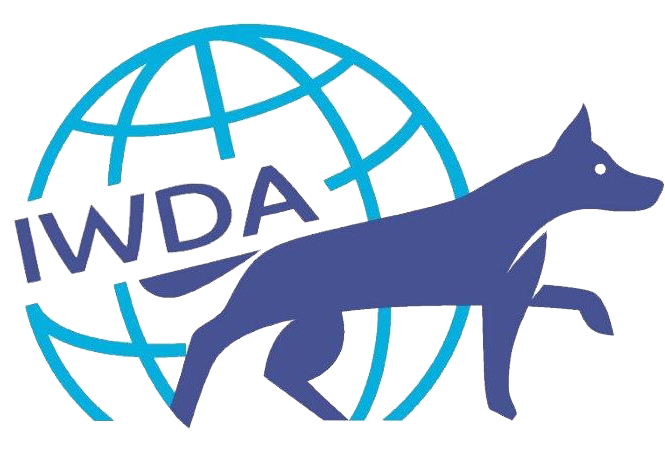2023 Vancouver Breeder's Workshop Recordings
The Vancouver Breeder’s Workshop was a busy event held immediately after the 2023 International Guide Dog Federation conference. We were thrilled to provide a wide range of educational topics thanks to the support of our excellent speakers and event attendees. Recordings are available below for IWDA members.
- The original program for Days 1 and 2 of the Workshop can be downloaded here: IWDA 2023 Breeders Workshop Program
- The original program for the Reproduction focus day can be downloaded here: IWDA 2023 Repro Focus Day Program
- The original program for the Behavior (BCL) focus day can be downloaded here: IWDA 2023 BCL Focus Day Program
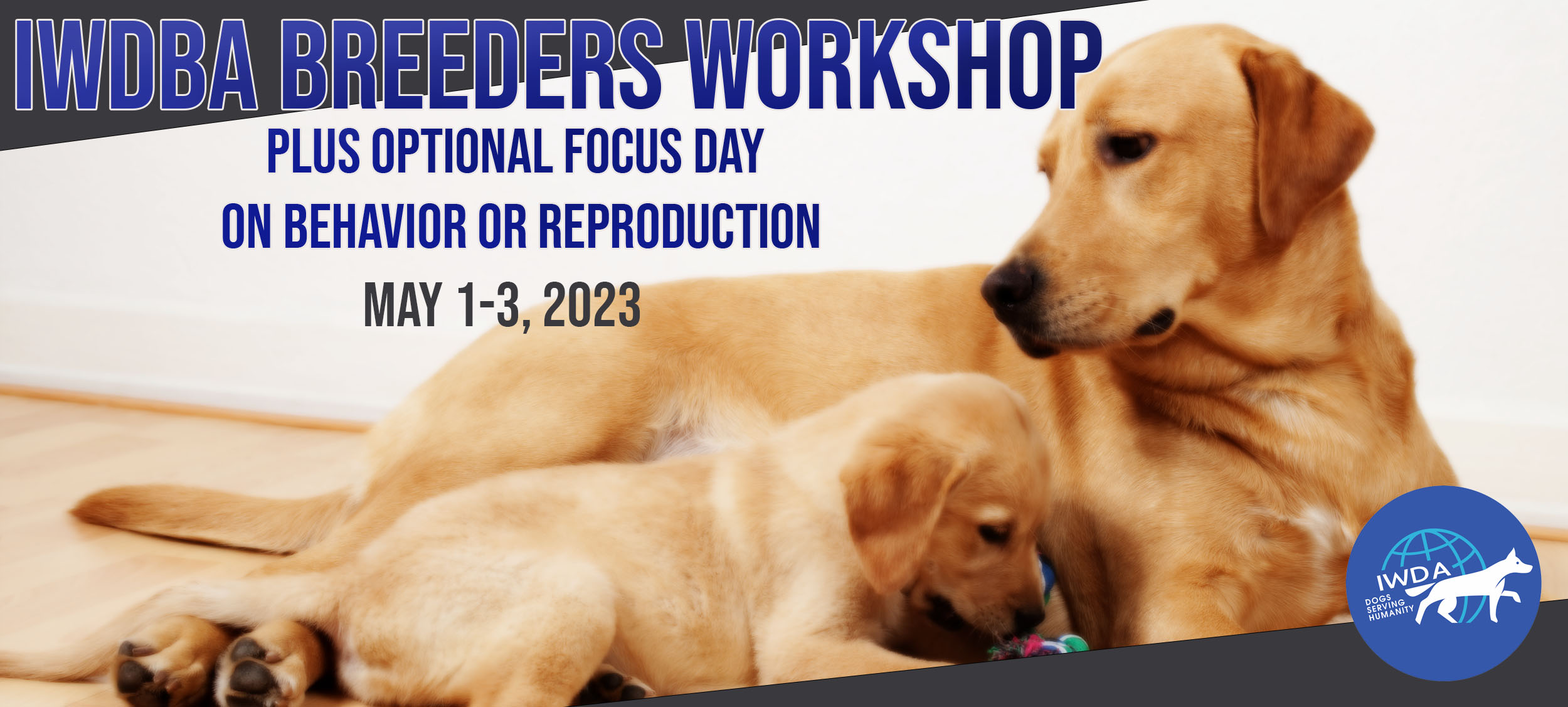
Day 1 (1 May 2023)
Time
1 May 2023
08:00
Presentation
Hip and elbow assessments – with Dr Bart Broeckx
What is the difference between the types of measurements (PennHIP, Vezzoni, Hip extended) and what problems arise when trying to interpret them? Where should our cut-off levels be for breeding or training?
Prof. Dr. Bart Broeckx, Msc Vet Med, Msc Stat Data Analysis, PhD is a Professor at the Laboratory of Animal Genetics, Faculty of Veterinary Medicine, Ghent University with research focused on the identification of (epi)genetic causes for various diseases, healthy breeding of cats and dogs in general and assistance dogs more specifically and the development of new sequencing and bio-informatics approaches to work on these topics.

This content is for members only. Please login or register to view it.
1 May 2023
08:35
Stargardt’s disease in Labrador retrievers – with Dr Katy Evans
Current information regarding Stargardt’s testing in Labrador Retrievers. Should dogs be rejected based on genotype? What is your selection strategy?
Katy Evans qualified as a veterinarian from the University of Bristol in 2001. After almost 7 years of clinical work, she undertook a Postgraduate Studentship in Small Animal Epidemiology at the Animal Health Trust, Newmarket, 2007-2010, funded by the Kennel Club Charitable Trust. This included working with survey data to investigate patterns of disease in particular dog breeds, while gaining an MSc in Veterinary Epidemiology and Public Health from the Royal Veterinary College, London.
Katy then took up a PhD Studentship, based at the Animal Health Trust, registered with the University of Nottingham and part funded by Guide Dogs UK. This entailed working with Guide Dogs’ historical health and behavioral data to investigate the potential for estimated breeding values (EBVs) for traits of interest, to improve the accuracy of selection decisions. In January 2015 she successfully defended her thesis, entitled ‘Genetic evaluation of guide dogs in the UK’. She spent two years as a Postdoctoral Research Fellow at Nottingham, working to turn the findings of her PhD into workable tools for Guide Dogs UK. Two years at the Kennel Club in London as Health Research Manager followed, with the key focus of Katy’s time there being getting the ‘Breed Health and Conservation Plans’ project off the ground.
In January 2019, Katy joined The Seeing Eye in Morristown, New Jersey, as the Jane H. Booker Chair in Canine Genetics, overseeing the breeding program at the oldest still existing guide dog school in the world. She has a career change Golden Retriever who decided that being a guide dog was not for her, and a young Border Collie who should never be allowed to guide anybody anywhere!
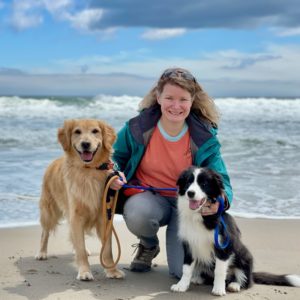
This content is for members only. Please login or register to view it.
1 May 2023
09:05
Skin allergies – with Dr Caroline Moeser
Recognition of diagnoses associated with canine atopic dermatitis. Environmental influences and the prevention of otitis externa.
Dr Caroline Moeser B.V.Sc. Caroline graduated from the University of Sydney with a Bachelor of Veterinary Science in 1994. She enjoyed working in small animal practice in Sydney for 13 years, with interests in orthopaedic surgery and dermatology. Caroline commenced working in 2008 as the Veterinarian at Guide Dogs NSW/ACT.
She became the Veterinary and Breeding Services Manager for Guide Dogs NSW/ACT in 2017. Her current role enables her to maintain her veterinary knowledge and apply this knowledge to the breeding program.
Caroline co-authored a paper on transitional lumbosacral vertebrae that was published in the Australian Veterinary Journal in 2017. She has also written a paper on faecal transplants and the potential impact on skin disease in the Labrador.
Caroline’s current focus is on reducing the incidence of atopic dermatitis in the Labrador through both a genetic and environmental focus.
Caroline spends her free time with her husband, three children, and various Labradors.
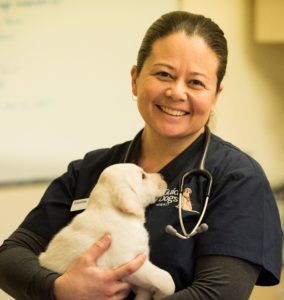
This content is for members only. Please login or register to view it.
1 May 2023
09:30
Is it really epilepsy? – with Dr Bob Proesmans & Dr Caroline Moeser
Many conditions can trigger seizure-like events. How do you differentiate among them? What is paroxysmal dyskinesia? What are the suspected triggers for episodes of head tremors? And a discussion of variant Benign Juvenile Epilepsy.
Bob runs a small animal veterinary practice together with his wife Mieke, also a vet, in Belgium since 1987.
As a founding member of the Flemish Working Group on Ethology, from which he was a board member for many years, he experienced the impact and importance of behavioural knowledge on pets and owners.
Bob also seated in the Order of Veterinary Surgeons, a council that is responsible for every legal and ethical aspect of the profession.
From 2013 up to 2022, Bob was a member of the International Guide Dog Federation’s Development Committee. In this Committee, Bob shared his personal veterinary expertise, but more importantly, puts the guide dog community in direct contact with international experts from the veterinary profession as a whole.
Since 2021, Bob is chair of the IGDF Dog Welfare Working Group. This working group provides the IGDF and its members with clear pragmatic information, in order to translate this into professional practice.
From 2017, Bob started a new challenging project, together with experienced engineers and veterinarians, specialized in orthopaedics, IT, statistics and genetics. This new “Purpose Dogs” project is a selective and well thought-out breeding project, in order to provide high quality pups to several service dogs schools, mainly but not restricted to Belgium. The project is strongly linked to the Veterinary Faculty of the University of Ghent, Belgium. Bob is the vice-president of Purpose Dogs, and his main interest and contribution to the project is reproduction and international collaboration.
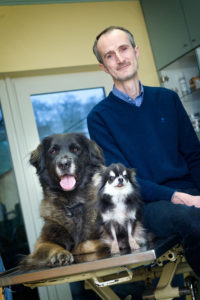
Dr Caroline Moeser B.V.Sc. Caroline graduated from the University of Sydney with a Bachelor of Veterinary Science in 1994. She enjoyed working in small animal practice in Sydney for 13 years, with interests in orthopaedic surgery and dermatology. Caroline commenced working in 2008 as the Veterinarian at Guide Dogs NSW/ACT.
She became the Veterinary and Breeding Services Manager for Guide Dogs NSW/ACT in 2017. Her current role enables her to maintain her veterinary knowledge and apply this knowledge to the breeding program.
Caroline co-authored a paper on transitional lumbosacral vertebrae that was published in the Australian Veterinary Journal in 2017. She has also written a paper on faecal transplants and the potential impact on skin disease in the Labrador.
Caroline’s current focus is on reducing the incidence of atopic dermatitis in the Labrador through both a genetic and environmental focus.
Caroline spends her free time with her husband, three children, and various Labradors.

This content is for members only. Please login or register to view it.
This content is for members only. Please login or register to view it.
1 May 2023
11:00
Cardiac diseases – presentation by Dr Kevin Conrad (absent); presented by Dr. Kyle Quigley
What are the most common conditions in Labrador Retrievers, Golden Retrievers, and German Shepherds? How and when should we screen for them? Do they matter for working dogs? Do they matter for breeding dogs?
Dr. Kevin Conrad had been a Veterinarian for 36 years with 11 in the Service dog industry. He is certified in Hyperbaric Medicine, Acupuncture, and Canine Rehabilitation Medicine, with a special interest in canine diarrhea, dysbiosis, and microbiome restoration. He is currently working on a website for all Service Dog organizations to have access to basic healthcare for their own dogs.
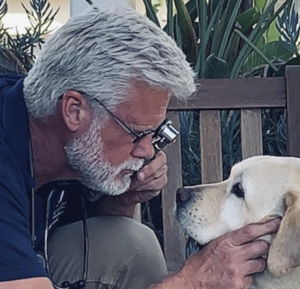
This content is for members only. Please login or register to view it.
1 May 2023
11:25
Does early potty training affect indiscriminate relieving? – presentation by Dr Lynna Feng
A data analysis on early potty training and dogs inappropriately urinating or defecating during Guide Dog training.
Lynna Feng is the Canine Behavior, Research, and Educational Manager at Guide Dogs for the Blind. Lynna holds a Master’s degree in Applied Statistics from Pennsylvania State University and a PhD in Psychology from La Trobe University in Melbourne, Australia. She joined Guide Dogs for the Blind in 2018 and has had the pleasure of contributing to a variety of research projects as well as the ongoing development of puppy socialization and training program curricula for puppies and puppy raising volunteers.
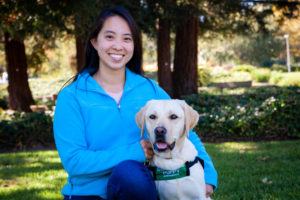
This content is for members only. Please login or register to view it.
1 May 2023
11:45
Healthy microbiome and faecal transplants – presentation by Dr Kevin Conrad (absent); presented by Dr Caroline Moeser
Importance and practical guidance used in guide dog organizations to re-establish and maintain a healthy microbiome. Procedure and results on the colony health will be presented.
Dr Caroline Moeser B.V.Sc. Caroline graduated from the University of Sydney with a Bachelor of Veterinary Science in 1994. She enjoyed working in small animal practice in Sydney for 13 years, with interests in orthopaedic surgery and dermatology. Caroline commenced working in 2008 as the Veterinarian at Guide Dogs NSW/ACT.
She became the Veterinary and Breeding Services Manager for Guide Dogs NSW/ACT in 2017. Her current role enables her to maintain her veterinary knowledge and apply this knowledge to the breeding program.
Caroline co-authored a paper on transitional lumbosacral vertebrae that was published in the Australian Veterinary Journal in 2017. She has also written a paper on faecal transplants and the potential impact on skin disease in the Labrador.
Caroline’s current focus is on reducing the incidence of atopic dermatitis in the Labrador through both a genetic and environmental focus.
Caroline spends her free time with her husband, three children, and various Labradors.

This content is for members only. Please login or register to view it.
1 May 2023
13:30
Entropion – presentation by Jenna Bullis
Reduction in the incidence of entropion in a colony through EBVs and mild selection pressure.
Originally from Fremont, California, Jenna graduated from San Diego State University with a B.A. in psychology with an emphasis in animal behavior and began her career at Guide Dogs for the Blind in 1997. Over the years Jenna has held the positions of Master Guide Dog Mobility Instructor, Training Supervisor and Research and Development Assistant. In 2007 she represented GDB internationally and completed a three-month O&M course with Guide Dogs Victoria in Melbourne, Australia. In 2011 Jenna became the breeding manager at GDB and enjoys managing the largest breeding colony in North America and collaborating with partner organizations all over the world.
Actively competing since the 90s in the American Kennel Club (AKC), first with Rottweilers and now with Portuguese Water dogs, led to her interest in breeding and genetics. Over the years Jenna has trained and titled her Rottweilers in numerous dog sports including; Schutzhund, Tracking, AKC conformation and obedience, and Herding. Currently she breeds and competes with Portuguese Water Dogs in Agility, Water Work, Conformation, and Obedience
Jenna shares her home with her husband, Grant and when not training her dogs, Jenna enjoys tennis, photography, and adventure travel.
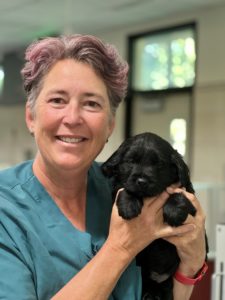
This content is for members only. Please login or register to view it.
1 May 2023
13:50
Gait and Structure Evaluation for Guide Dogs – presentation by Peggy Gibbon and Dr Katy Evans
Assessment and scoring of conformation and gaits in guide dogs. Implications for success and breeding.
Peggy Gibbon is the Director of Canine Development at The Seeing Eye®, Inc. She began working at The Seeing Eye as an instructor in 1983. She supervised the Apprentice Instructor program from 1997-2007 and managed the Puppy Development Program for several years before moving to her current position.
She enjoys having involvement in the dogs’ progress through the program, from early enrichment to Puppy Development, Training and eventually breeding, graduation or another career.
Peggy enjoys working with her own dogs outside of work and competes in a variety of performance events. She also spends her free time hiking and horseback riding.
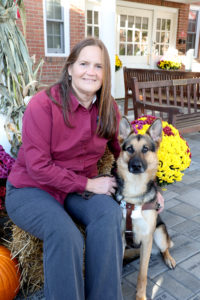
Katy Evans qualified as a veterinarian from the University of Bristol in 2001. After almost 7 years of clinical work, she undertook a Postgraduate Studentship in Small Animal Epidemiology at the Animal Health Trust, Newmarket, 2007-2010, funded by the Kennel Club Charitable Trust. This included working with survey data to investigate patterns of disease in particular dog breeds, while gaining an MSc in Veterinary Epidemiology and Public Health from the Royal Veterinary College, London.
Katy then took up a PhD Studentship, based at the Animal Health Trust, registered with the University of Nottingham and part funded by Guide Dogs UK. This entailed working with Guide Dogs’ historical health and behavioral data to investigate the potential for estimated breeding values (EBVs) for traits of interest, to improve the accuracy of selection decisions. In January 2015 she successfully defended her thesis, entitled ‘Genetic evaluation of guide dogs in the UK’. She spent two years as a Postdoctoral Research Fellow at Nottingham, working to turn the findings of her PhD into workable tools for Guide Dogs UK. Two years at the Kennel Club in London as Health Research Manager followed, with the key focus of Katy’s time there being getting the ‘Breed Health and Conservation Plans’ project off the ground.
In January 2019, Katy joined The Seeing Eye in Morristown, New Jersey, as the Jane H. Booker Chair in Canine Genetics, overseeing the breeding program at the oldest still existing guide dog school in the world. She has a career change Golden Retriever who decided that being a guide dog was not for her, and a young Border Collie who should never be allowed to guide anybody anywhere!

This content is for members only. Please login or register to view it.
1 May 2023
14:25
Superficial Digital Flexor Tendon Avulsion – presentation by Dr Caroline Moeser
Do you have a patellar luxation or a superficial digital flexor tendon avulsion? A quick review of a condition that can present with symptoms similar to a patellar luxation, how is it inherited and what does it mean for the future of the dog?
Dr Caroline Moeser B.V.Sc. Caroline graduated from the University of Sydney with a Bachelor of Veterinary Science in 1994. She enjoyed working in small animal practice in Sydney for 13 years, with interests in orthopaedic surgery and dermatology. Caroline commenced working in 2008 as the Veterinarian at Guide Dogs NSW/ACT.
She became the Veterinary and Breeding Services Manager for Guide Dogs NSW/ACT in 2017. Her current role enables her to maintain her veterinary knowledge and apply this knowledge to the breeding program.
Caroline co-authored a paper on transitional lumbosacral vertebrae that was published in the Australian Veterinary Journal in 2017. She has also written a paper on faecal transplants and the potential impact on skin disease in the Labrador.
Caroline’s current focus is on reducing the incidence of atopic dermatitis in the Labrador through both a genetic and environmental focus.
Caroline spends her free time with her husband, three children, and various Labradors.

This content is for members only. Please login or register to view it.
1 May 2023
14:40
Conditioning Program for Dogs Coming In For Training – presentation by Dr Kevin Conrad (via zoom)
Foundational fitness addresses mobility, stability (e.g., core, forelimb, hindlimb), strength, and proprioception. Using the GDBart Test results dogs were identified that would benefit from specific exercise to improve control of movement, balance and proprioception. Examples using video and results will be presented.
Dr. Kevin Conrad had been a Veterinarian for 36 years with 11 in the Service dog industry. He is certified in Hyperbaric Medicine, Acupuncture, and Canine Rehabilitation Medicine, with a special interest in canine diarrhea, dysbiosis, and microbiome restoration. He is currently working on a website for all Service Dog organizations to have access to basic healthcare for their own dogs.

This content is for members only. Please login or register to view it.
1 May 2023
16:15
Improving health using EBVs: Elbow, Skin and Mast cell tumours – presentation by Madeline Zimmermann
Covering what data is required and the best age to measure, heritability of each trait, response to selection, and challenges.
Madeline Zimmermann earned her B.S. in Animal and Poultry Sciences at Virginia Tech, followed by a M.S. studying quantitative animal breeding and genetics at the University of Nebraska – Lincoln. Her interest in animal breeding and genetics began as a “horse-crazy” child but was solidified by her undergraduate animal breeding and genetics course – particularly a simulated sheep breeding project – and a subsequent summer internship calculating estimated breeding values at Guiding Eyes for the Blind. Madeline then worked at Guiding Eyes for the Blind as the Genetic Analyst for 3 years. During this time, she developed and modified genetic models for various health and behavior traits, maintained routine estimated breeding value and genetic selection index calculations, oversaw breeding colony management to advance genetic progress, and assisted in data integrity management and research projects. For the past year, she has worked with the IWDR team to support other organizations’ breeding colony management and breeder selection.

This content is for members only. Please login or register to view it.
1 May 2023
16:50
Improving behavior with EBVs: Body sensitivity, Noise Fear, Inhibited by Stress, Activated by Stress, Excitable – presentation by Jane Russenberger
Covering what data is required and the best age to measure, heritability of each trait, response to selection, and challenges.
Jane Russenberger- BS Quinnipiac University Hamden CT, Laboratory Animal Technology
As a member of the International Working Dog Registry (IWDR) development and support team, Jane Russenberger continues her passion for helping working dog organizations produce healthier, more behaviorally appropriate dogs year after year. Jane also volunteers with project management for Guiding Eyes for the Blind, where she work ed for 33 years as Director of Canine Development, Breeding. and Genetics. In those roles, Jane oversaw production of about 450 Labrador Retriever and German Shepherd puppies each year, with many of them destined for careers as guide dogs. Retiring from Guiding Eyes has enabled Jane to share what she learned over 37 years.
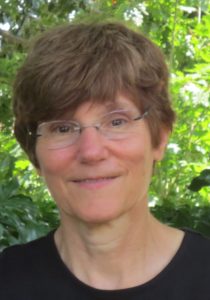
This content is for members only. Please login or register to view it.
1 May 2023
17:25
How to make breeding decisions on traits without EBVs – presentation by Madeline Zimmermann
When you don’t have enough data for utilizing EBVs, how do you approach breeder selection?
Using examples of TVD, Head Tremors and Corneal Lipid Dystrophy, this presentation will show you the methods to improve your breeding program without EBVs.
Madeline Zimmermann earned her B.S. in Animal and Poultry Sciences at Virginia Tech, followed by a M.S. studying quantitative animal breeding and genetics at the University of Nebraska – Lincoln. Her interest in animal breeding and genetics began as a “horse-crazy” child but was solidified by her undergraduate animal breeding and genetics course – particularly a simulated sheep breeding project – and a subsequent summer internship calculating estimated breeding values at Guiding Eyes for the Blind. Madeline then worked at Guiding Eyes for the Blind as the Genetic Analyst for 3 years. During this time, she developed and modified genetic models for various health and behavior traits, maintained routine estimated breeding value and genetic selection index calculations, oversaw breeding colony management to advance genetic progress, and assisted in data integrity management and research projects. For the past year, she has worked with the IWDR team to support other organizations’ breeding colony management and breeder selection.

This content is for members only. Please login or register to view it.
Day 2 (2 May 2023)
2 May 2023
08:00
How to use estimated breeding values successfully – presentation by Madeline Zimmermann
Demonstrating how IWDR can apply the 3 principles of selection: Selecting breeder candidates, choosing mates, and choosing which dogs to retire.
Madeline Zimmermann earned her B.S. in Animal and Poultry Sciences at Virginia Tech, followed by a M.S. studying quantitative animal breeding and genetics at the University of Nebraska – Lincoln. Her interest in animal breeding and genetics began as a “horse-crazy” child but was solidified by her undergraduate animal breeding and genetics course – particularly a simulated sheep breeding project – and a subsequent summer internship calculating estimated breeding values at Guiding Eyes for the Blind. Madeline then worked at Guiding Eyes for the Blind as the Genetic Analyst for 3 years. During this time, she developed and modified genetic models for various health and behavior traits, maintained routine estimated breeding value and genetic selection index calculations, oversaw breeding colony management to advance genetic progress, and assisted in data integrity management and research projects. For the past year, she has worked with the IWDR team to support other organizations’ breeding colony management and breeder selection.

This content is for members only. Please login or register to view it.
2 May 2023
08:35
Strategies for genetic diversity – presentation by Jackie Clark and Dr Bart Broeckx
How do we maintain genetic diversity in smaller breeding colonies? A discussion of the strategies you can use for your colony to maintain diversity, such as: utilizing Mate Finder in IWDR; freeze the male then train him; building collaborations; general guidelines for increasing likelihood of conception; and considerations in shipping dogs.
Jackie Clark is the Breeding and Puppy Program Manager for Pacific Assistance Dogs Society (PADS), located in Vancouver, Canada. Over 20+ years at PADS, she has focused on building a breeding program from the ground up, and is passionate about helping other assistance dog schools get their own purpose-bred colony off the ground. She is currently serving her third term on the Steering Committee of the Assistance Dogs International – North America Breeding Cooperative (ABC). Her joint interests are breeding and behaviour, and she enjoys using behaviour science to build on the genetic potential of assistance dog prospects.
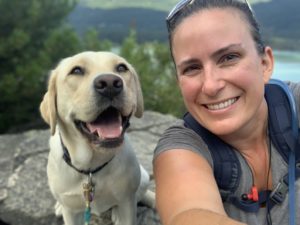
Prof. Dr. Bart Broeckx, Msc Vet Med, Msc Stat Data Analysis, PhD is a Professor at the Laboratory of Animal Genetics, Faculty of Veterinary Medicine, Ghent University with research focused on the identification of (epi)genetic causes for various diseases, healthy breeding of cats and dogs in general and assistance dogs more specifically and the development of new sequencing and bio-informatics approaches to work on these topics.

This content is for members only. Please login or register to view it.
2 May 2023
09:05
Calculating Differential Risk of Osteoarthritis in Dogs with Low vs High Hip Scores – presentation by Dr Tom Lewis
Determining which traits receive priority for genetic selection can be aided by determining the risk for developing clinical disease in a population of dogs based on retrospective data. This example uses phenotype data of osteoarthritis diagnosis in 8 and 12 year old dogs with either ‘low’ or ‘high’ hip score at 1 year old. The results of risk by breed and also when the osteoarthritis diagnoses are made will be shared.
Tom is a quantitative geneticist and has spent over a decade in research focusing on the genetic analysis of complex inherited disease and population structure in pedigree dog breeds. With a background in animal science, he gained his PhD investigating multiple aspects of quantitative genetics at the Roslin Institute and Nottingham University. Since then, Tom has worked at the Animal Health Trust and the Kennel Club, using pedigree and health testing data as the basis of his research, including the provision of estimated breeding values (estimates of genetic risk of hip and elbow disease), for multiple Kennel Club registered breeds. He joined Guide Dogs as Head of Canine Genetics in January 2021.

This content is for members only. Please login or register to view it.
2 May 2023
09:25
The Overall Selection Index – presentation by Dr Eldin Leighton
What is it and how do you use it in your breeding program to identify a genetically diverse cohort of young dogs as replacement breeders. Choosing the traits and how much influence they have on the selection index based on your breeding goals.
The International Working Dog Registry (IWDR) provides a world-class record-keeping service for all organizations worldwide that breed working dogs in large numbers. Dr. Leighton, along with a small, but very dedicated team of developers began IWDR construction as a part-time project in 2012. Full-time development continued in 2015 when Dr. Leighton officially retired as Breeding Program Manager for The Seeing Eye. During the last 10 years with The Seeing Eye, he held the Jane H. Booker Chair in Canine Genetics, where he was responsible for producing about 500 to 600 puppies each year. The International Working Dog Association, which owns IWDR, has been an important focus of Dr. Leighton’s professional life, since he attended the 2001 Conference in San Antonio, Texas. In 2005, Dr. Leighton was appointed to the IWDBA Board of Directors, then was subsequently elected as the Board’s first President. Dr. Leighton’s experience in the dog breeding world was acquired first as the Research Geneticist working with the U.S. Army Bio-Sensor Research Division from 1973-1976, then as a consultant for The Seeing Eye from 1977 through 1994. After “retiring” in 2015, Dr. Leighton started a private company, Canine Genetic Services, LLC (CGS), and through this company, he and others now provide maintenance and development support of IWDR, and they provide breeding program management services under long-term contracts with organizations that breed and train working dogs. CGS is a fully-licensed enterprise willing to conduct business world-wide.
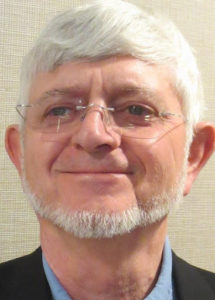
This content is for members only. Please login or register to view it.
2 May 2023
10:30
Critical periods of socialization and impact on temperament of the dog – presentation by Jane Russenberger
Presentation of data analysis between groups of dogs in which socialization has been interrupted. When are the critical periods and how much of an impact does it make?
This presentation incorporates the preliminary research of Dr Kathrine Lord PhD who has kindly allowed Jane to share her research.
Jane Russenberger- BS Quinnipiac University Hamden CT, Laboratory Animal Technology
As a member of the International Working Dog Registry (IWDR) development and support team, Jane Russenberger continues her passion for helping working dog organizations produce healthier, more behaviorally appropriate dogs year after year. Jane also volunteers with project management for Guiding Eyes for the Blind, where she work ed for 33 years as Director of Canine Development, Breeding. and Genetics. In those roles, Jane oversaw production of about 450 Labrador Retriever and German Shepherd puppies each year, with many of them destined for careers as guide dogs. Retiring from Guiding Eyes has enabled Jane to share what she learned over 37 years.

This content is for members only. Please login or register to view it.
2 May 2023
11:00
GDBart Puppy Test – presentation by Helen West
Conducting the GDBart Puppy Test: is it worth it, is it predictive and how can the data help your organization and your breeding colony?
Helen West has a background in human and canine psychology, and is a Canine Behavior Specialist with Guiding Eyes for the Blind. She performs the behavioral selection of dogs for raising, training and breeding using the Behavior Checklist (BCL). Over eleven years, Helen has evaluated over seven thousand adult dogs and puppies with the BCL. She is working with IAABC and IWDR on a BCL Certification qualification where Helen is a Gold Standard scorer.
Helen also hosted a global webinar series on temperament evaluation using the BCL, available on IWDR. Helen helped create, and maintains the Puppy Socialization Program at Guiding Eyes.
She enjoys woodworking and hiking with her family.
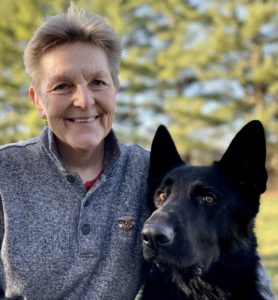
This content is for members only. Please login or register to view it.
2 May 2023
11:25
Dog behavior is in the eye of the beholder – presentation by Joke Monteny
Abstract unavailable
Dr. ir. Joke Monteny is a lecturer and researcher at Vives College in Roeselare Belgium.
She teaches ethology, applied dog ethology, animal handling and training in various courses, including bachelor of applied engineering and biotechnology, option animal care, postgraduate animal care, training shelter workers and breeders of dogs and/or cats.
The main focus of the scientific research is the social behavior of dogs towards people and its impact on the human-dog relationship. The last 5 years, the group is searching and working on the development of an objective scoring tool to evaluate the social capacities of dogs. At the Ghent University, Faculty of Veterinary Medicine, she teaches the practical classes on dog language.
She is the founder of Hond Inform, an education and training center which provides services related to training and handling of animals.
Much of the practical work involves assisting families in raising their puppy, behavior analyses of ‘problem’ dogs and setting up rehabilitation programs for people with their dog. Training experience has been shaped by working with more than 1500 cases. She provides training, refresher courses and supervisions on handling / training dogs for professionals such as trainers of assistant dogs, government, veterinarians,… In addition, she is often involved as a specialist in establishing training programs for zoo animals. As well as the implementation of programs to score or improve welfare in laboratory dogs.
Joke is author and co-author of several vulgar and scientific articles on dog behavior including several peer review publications on dog behavior (a.o. in the BSAVA Manual of Canine Practice).
She is freelance advisor to Purpose Dogs (Belgian Non-Profit Organisation) on selection, training and behavioral advice regarding their dogs.
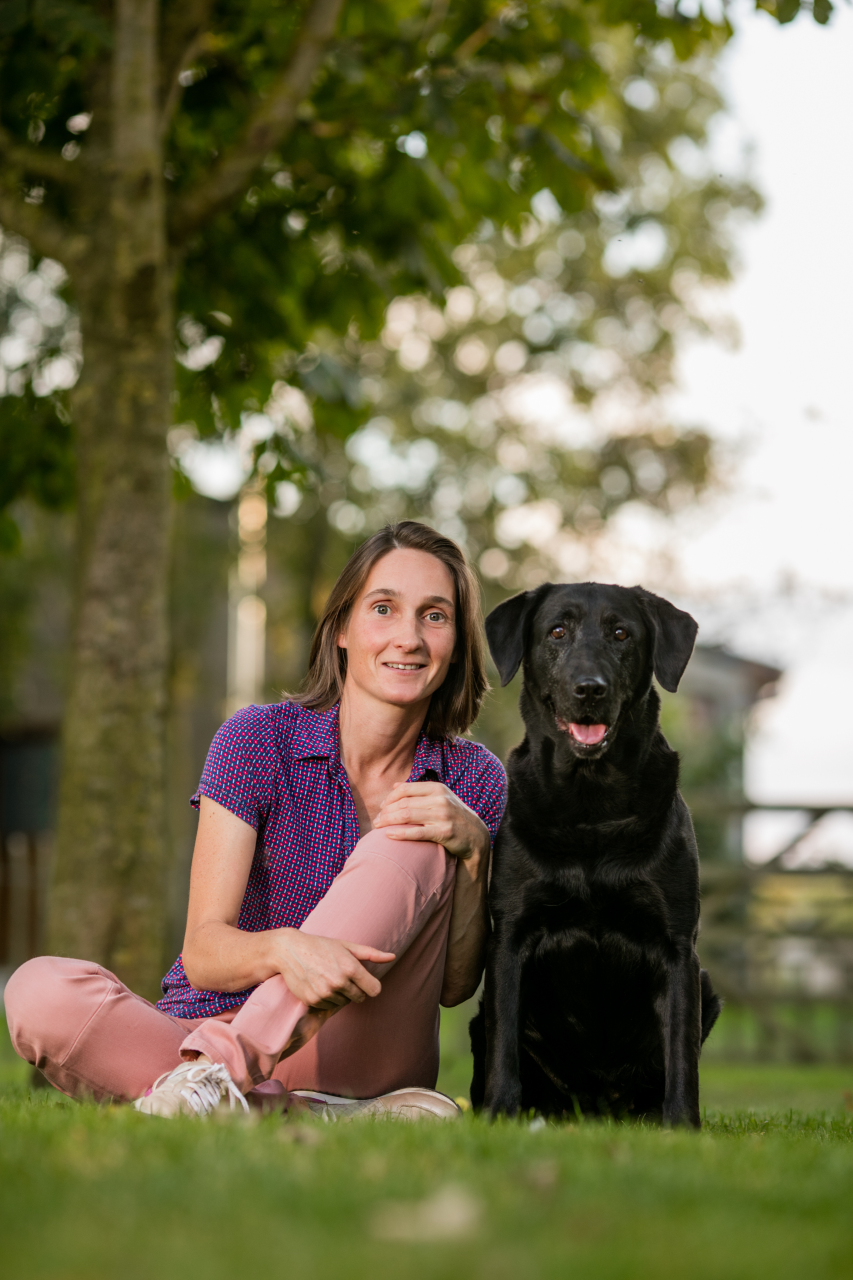
This content is for members only. Please login or register to view it.
PDF unavailable.
2 May 2023
11:50
Behavioral scoring in Puppy Raising – presentation by Helen West
A look at behavior assessments between the ages of 2 months to 18 months. Which are the best ages to collect data? What information do you get? How to develop consistency for data analysis?
Helen West has a background in human and canine psychology, and is a Canine Behavior Specialist with Guiding Eyes for the Blind. She performs the behavioral selection of dogs for raising, training and breeding using the Behavior Checklist (BCL). Over eleven years, Helen has evaluated over seven thousand adult dogs and puppies with the BCL. She is working with IAABC and IWDR on a BCL Certification qualification where Helen is a Gold Standard scorer.
Helen also hosted a global webinar series on temperament evaluation using the BCL, available on IWDR. Helen helped create, and maintains the Puppy Socialization Program at Guiding Eyes.
She enjoys woodworking and hiking with her family.

This content is for members only. Please login or register to view it.
2 May 2023
13:30
Selecting Reproductively Healthy Dogs – presentation by Dr Emmanuel Fontaine
Practical Must Do Screening for large breed (Lab, GS, Golden) females and males, acceptable abnormalities and how to manage unacceptable abnormalities for the individual and/or long term fertility in the colony.
Emmanuel Fontaine graduated from the Toulouse Veterinary School in 2004, he continued his studies at the Alfort Veterinary School (Paris) as trainee Vet in the domestic carnivore unit of the Reproduction Department. From 2005 to 2011, he worked at the Centre d’Etude en Reproduction des Carnivores (CERCA) [Research Centre for Reproduction in Carnivores], a unit specializing in pet breeding assistance. Emmanuel Fontaine is also qualified at the European College for Animal Reproduction (ECAR) and completed his PhD in 2012 on the use of GnRH agonists in canines. From September 2011 to September 2018, he worked as Technical Services Veterinarian for the PRO team at Royal Canada. He then was in charge of Scientific Communication for the Americas until August 2022. He now works as Senior Scientific Communications Veterinarian for Royal Canin North America.

This content is for members only. Please login or register to view it.
2 May 2023
13:50
Brood and Whelping Concerns – presentation by Dr Greg Burns
Care of the brood through pregnancy, whelping and lactation. Is there a way we can prevent mastitis and reduce our caesarean sections? When should we breed again after a C-section?
Dr. Greg Burns is a board certified Theriogenologist (reproductive specialist) originally from Phoenix, Arizona. He received his D.V.M. from Colorado State University in 1996 and entered small animal general practice focused on canine reproduction in Phoenix. It was during this time that Dr. Burns began working with breeders of conformation dogs, working dogs and performance dogs. Upon returning to Colorado in 2000, he worked as an associate veterinarian at a small animal practice in Fort Collins. In 2002, Dr. Burns became a partner in the practice and served as medical director, a position he held for 15 years. He developed a small animal reproduction department which included an international semen freeze and storage facility. It was also during this time that Dr. Burns completed the mentorship residency program through the American College of Theriogenologists and became a board certified Theriogenologist. He has been performing transcervical insemination in the canine for over 20 years and has TCI experience in other species as well (including Amur Tigers!). Dr. Burns has been a lecturer in small animal theriogenology at Colorado State University since 2006 and an affiliate faculty member until 2019. Currently, he is an Assistant Professor of Theriogenology in the Small Animal Reproduction Department at Colorado State University.

This content is for members only. Please login or register to view it.
2 May 2023
15:30
Neonatal Care – presentation by DR EMMANUEL FONTAINE
Care of the neonate from 0-8 weeks. What are the common problems that occur, what to do? How can we reduce or prevent them?
Emmanuel Fontaine graduated from the Toulouse Veterinary School in 2004, he continued his studies at the Alfort Veterinary School (Paris) as trainee Vet in the domestic carnivore unit of the Reproduction Department. From 2005 to 2011, he worked at the Centre d’Etude en Reproduction des Carnivores (CERCA) [Research Centre for Reproduction in Carnivores], a unit specializing in pet breeding assistance. Emmanuel Fontaine is also qualified at the European College for Animal Reproduction (ECAR) and completed his PhD in 2012 on the use of GnRH agonists in canines. From September 2011 to September 2018, he worked as Technical Services Veterinarian for the PRO team at Royal Canada. He then was in charge of Scientific Communication for the Americas until August 2022. He now works as Senior Scientific Communications Veterinarian for Royal Canin North America.

This content is for members only. Please login or register to view it.
PDF unavailable.
Day 3 (3 May 2023) - Reproduction Workshop
3 May 2023
08:00
“All about the boy” – Semen Collection and Analysis – presentation by Dr. Fiona Hollinshead
This session will focus on the canine stud including areas such as:
● Getting a male comfortable for mating and collections
● Assessing fertility in new potential stud- should we keep him?
● Determination of common problems (palpation of the testes, difficulty getting a “tie”, environmental influences)
There is value in using shared semen but how do you get started and how do you use it efficiently and effectively? This session will teach participants how to collect and analyse canine semen and how to problem solve when things do not go right
- What is ‘normal’
- Steps to assessing semen: Basic and more advanced
- Types of abnormalities and what do they mean? Should we use him for the mating? Do we need to retire him?
- Flowchart- what went wrong- we thought the semen looked ok.
Semen Collection and Handling
This session will focus on the collection and handling issues that can alter semen quality including:
- Methods surrounding semen collection
- The impact of environmental temperature
- Media and materials for semen storage
- How to store and prep the semen for shipping.
Chilled and Frozen Semen
What is the difference between chilled and frozen semen and how do you select the best method for your colony?
How to freeze and thaw semen correctly
How do you set-up for introducing semen freezing in your colony? What are the common problems that you encounter? Is it feasible for a small organization or should you rely on external companies?
Dr Fiona Hollinshead graduated from The University of Sydney, Australia in 1996 with a Bachelor of Veterinary Science (Honors) and in 2004 with a PhD in sperm sexing and assisted reproductive technologies. Fiona completed a clinical residency in Theriogenology at Cornell University in 2006 and in the same year became a Diplomate of the American College of Theriogenologists and a Registered Specialist in Small Animal Veterinary Reproduction with the Australasian Veterinary Boards Council. Fiona has a strong interest in canine semen biology and reproductive technologies as well as clinical research, teaching and clinical service. Prior to moving to CSU last year to take up a faculty position as Associate Professor in Small Animal Reproduction, Fiona managed a rapidly growing referral practice dedicated to small animal reproduction in New Zealand called “Glenbred” that was initially founded by Dr Marion Wilson who is the inventor of the now internationally practise non- invasive, endoscopic intrauterine insemination technique in bitches called ‘Transcervical Insemination or ‘TCI’. During Fiona’s 12 years in New Zealand she was the reproductive consultant to the New Zealand Guide Dogs, MPI Detector Dogs and the New Zealand Police and detector dog breeding units, which involved the production of over 350 puppies per year and with the majority of breedings performed with frozen semen imported from other international agencies. Fiona has published 8 book chapters in the field of small animal reproduction and over 55 scientific and clinical refereed publications in small animal reproduction and artificial assisted technologies. Fiona is passionate about large scale working dog breeding programs. Her goal is to provide breeding information and the use of artificial reproductive technologies to large scale breeding programs to facilitate exceptional reproductive performance, and in combination with optimal genetic selection, to ensure the efficient production of generations of a continually improved working dog population for specialized large scale working dog organisations.
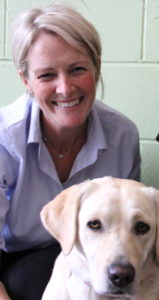
This content is for members only. Please login or register to view it.
3 May 2023
10:45
All about the brood – presentation by Dr. Greg Burns
This session will focus on the female side of reproduction including
- Ovulation timing – Should you still use cytology if you have access to progesterone testing? What to do when the progesterone just does not make sense. When would you mate? Are all progesterone machines the same?
- Vaginoscopy – What is the value and how do you perform a vaginoscopy? What is required for the set-up?
- General requirements for successful breedings
- What are some of the common problems you may encounter?
- Cystic endometrial hyperplasia, mucometra and cystic ovarian syndrome.
- Vaginal cultures – how do you interpret and are they necessary?
- Is mycoplasma really a problem?
Dr. Greg Burns is a board certified Theriogenologist (reproductive specialist) originally from Phoenix, Arizona. He received his D.V.M. from Colorado State University in 1996 and entered small animal general practice focused on canine reproduction in Phoenix. It was during this time that Dr. Burns began working with breeders of conformation dogs, working dogs and performance dogs. Upon returning to Colorado in 2000, he worked as an associate veterinarian at a small animal practice in Fort Collins. In 2002, Dr. Burns became a partner in the practice and served as medical director, a position he held for 15 years. He developed a small animal reproduction department which included an international semen freeze and storage facility. It was also during this time that Dr. Burns completed the mentorship residency program through the American College of Theriogenologists and became a board certified Theriogenologist. He has been performing transcervical insemination in the canine for over 20 years and has TCI experience in other species as well (including Amur Tigers!). Dr. Burns has been a lecturer in small animal theriogenology at Colorado State University since 2006 and an affiliate faculty member until 2019. Currently, he is an Assistant Professor of Theriogenology in the Small Animal Reproduction Department at Colorado State University.

This content is for members only. Please login or register to view it.
PDF unavailable.
3 May 2023
12:00
Feeding for Breeding Success – presentation by Dr. Emmanuel Fontaine
Abstract not available.
Emmanuel Fontaine graduated from the Toulouse Veterinary School in 2004, he continued his studies at the Alfort Veterinary School (Paris) as trainee Vet in the domestic carnivore unit of the Reproduction Department. From 2005 to 2011, he worked at the Centre d’Etude en Reproduction des Carnivores (CERCA) [Research Centre for Reproduction in Carnivores], a unit specializing in pet breeding assistance. Emmanuel Fontaine is also qualified at the European College for Animal Reproduction (ECAR) and completed his PhD in 2012 on the use of GnRH agonists in canines. From September 2011 to September 2018, he worked as Technical Services Veterinarian for the PRO team at Royal Canada. He then was in charge of Scientific Communication for the Americas until August 2022. He now works as Senior Scientific Communications Veterinarian for Royal Canin North America.

This content is for members only. Please login or register to view it.
3 May 2023
13:30
The art of insemination – presentation by Dr. Fiona Hollinshead
This session will discuss vaginal artificial insemination (A.I.) vs Transcervical Insemination (TCI).
● How to set up and what the procedures involve.
● Video demonstrations of TCI inseminations – what is normal and easy, and tips and tricks for making it so.
Dr Fiona Hollinshead graduated from The University of Sydney, Australia in 1996 with a Bachelor of Veterinary Science (Honors) and in 2004 with a PhD in sperm sexing and assisted reproductive technologies. Fiona completed a clinical residency in Theriogenology at Cornell University in 2006 and in the same year became a Diplomate of the American College of Theriogenologists and a Registered Specialist in Small Animal Veterinary Reproduction with the Australasian Veterinary Boards Council. Fiona has a strong interest in canine semen biology and reproductive technologies as well as clinical research, teaching and clinical service. Prior to moving to CSU last year to take up a faculty position as Associate Professor in Small Animal Reproduction, Fiona managed a rapidly growing referral practice dedicated to small animal reproduction in New Zealand called “Glenbred” that was initially founded by Dr Marion Wilson who is the inventor of the now internationally practise non- invasive, endoscopic intrauterine insemination technique in bitches called ‘Transcervical Insemination or ‘TCI’. During Fiona’s 12 years in New Zealand she was the reproductive consultant to the New Zealand Guide Dogs, MPI Detector Dogs and the New Zealand Police and detector dog breeding units, which involved the production of over 350 puppies per year and with the majority of breedings performed with frozen semen imported from other international agencies. Fiona has published 8 book chapters in the field of small animal reproduction and over 55 scientific and clinical refereed publications in small animal reproduction and artificial assisted technologies. Fiona is passionate about large scale working dog breeding programs. Her goal is to provide breeding information and the use of artificial reproductive technologies to large scale breeding programs to facilitate exceptional reproductive performance, and in combination with optimal genetic selection, to ensure the efficient production of generations of a continually improved working dog population for specialized large scale working dog organisations.

This content is for members only. Please login or register to view it.
This content is for members only. Please login or register to view it.
3 May 2023
15:00
What influences semen quality? – presentation by Dr. Tom Lewis
Taking a look at the temporal trends in a number of semen traits. Genetic analysis of these traits and determination of heritability.
Tom is a quantitative geneticist and has spent over a decade in research focusing on the genetic analysis of complex inherited disease and population structure in pedigree dog breeds. With a background in animal science, he gained his PhD investigating multiple aspects of quantitative genetics at the Roslin Institute and Nottingham University. Since then, Tom has worked at the Animal Health Trust and the Kennel Club, using pedigree and health testing data as the basis of his research, including the provision of estimated breeding values (estimates of genetic risk of hip and elbow disease), for multiple Kennel Club registered breeds. He joined Guide Dogs as Head of Canine Genetics in January 2021.

This content is for members only. Please login or register to view it.
3 May 2023
16:00
Reproductive Trends and Cryogenic Insights from Guiding Eyes – presentation by Clover Williams
This session will discuss a variety of fertility trends seen at Guiding Eyes, as well as some statistics, considerations and advice for those curious about pursuing frozen semen at their organization.
Clover Williams brings her experience as the Reproduction and Cryogenics Manager of Guiding Eyes for the Blind, where she has worked for the past 20 years. She holds an associate degree in Equine Science, as well as a bachelor’s degree in Agricultural Business, and spent her early career tending horses at various equine hospitals and breeding farms. She gratefully acknowledges her love for animals and reproduction was firmly cemented in childhood, with the calves and foals on her family’s dairy farm in Vermont, which still exists today.
Her two teenaged children, Jack and Hope, and a ruby Cavalier named Rooster, fill her home with challenges, laughter, and love. She finds that riding her bike or gardening brings peace amidst the chaos of daily life.
At Guiding Eyes, conducting the health screenings of breeder candidates and providing oversight of the 80 plus matings each year, keeps her quite busy. Over the years she has hosted and mentored veterinarians and technicians from the U.S. as well as abroad, in various aspects of reproduction and cryogenics, primarily the Transcervical Insemination technique. Clover cites international shipments of semen and live animals as the reason for her gray hairs but takes great pride in seeing the legacy of Guiding Eyes dogs continue in pedigrees around the world. International exchanges and collaborations are some of the most rewarding aspects of her work and she is pleased to be a part of this Breeders Workshop.
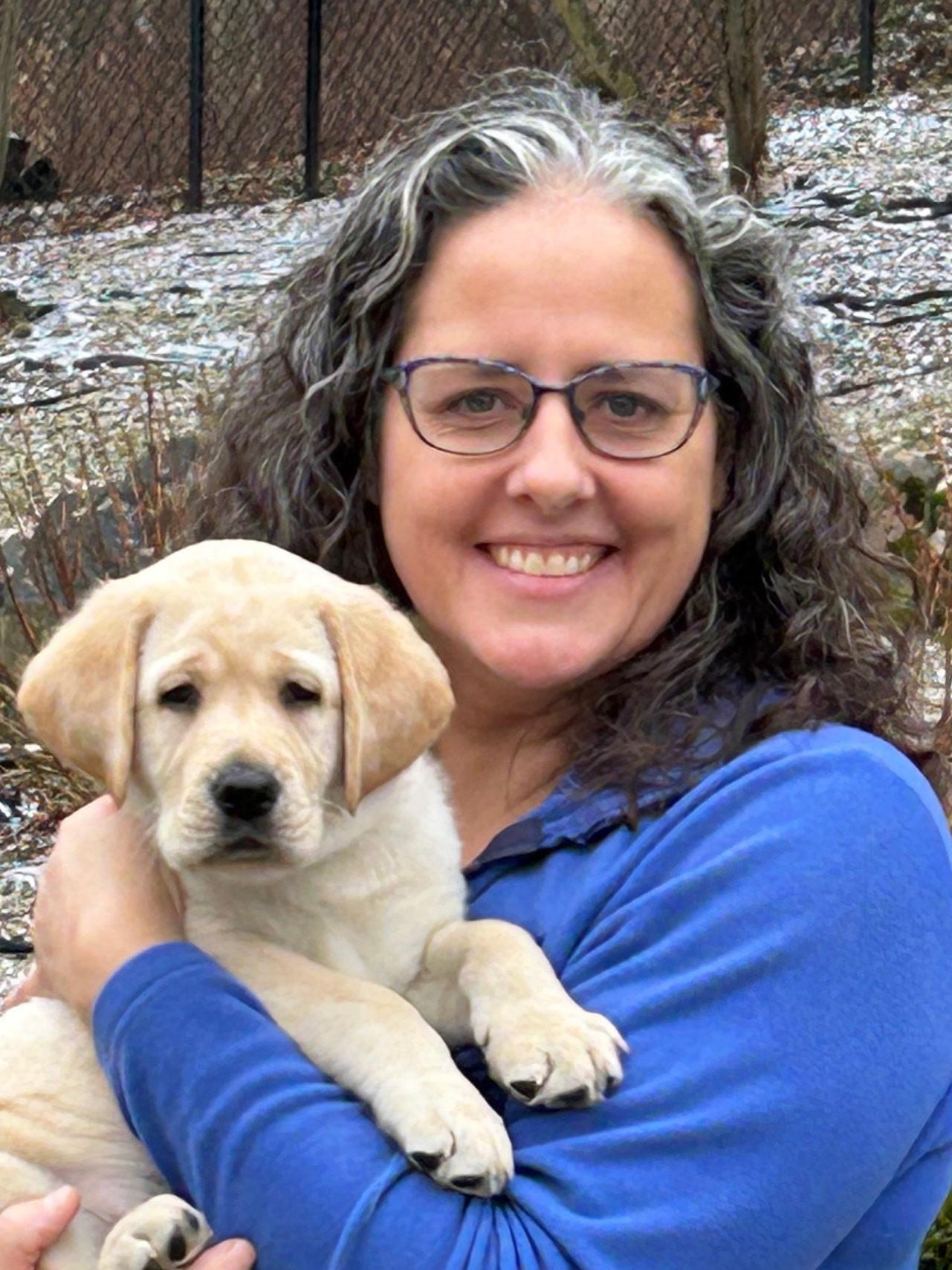
This content is for members only. Please login or register to view it.
Day 3 (3 May 2023) - Behavior (BCL) Workshop
3 May 2023
All Day
BCL Focus Day – with Helen West
This focus day showcases multiple dogs as they complete a Behavior Checklist and includes discussion on grading the dogs as per the BCL definitions.
The recordings of this day have been broken into 5 videos. The first video is a discussion/review of the BCL and some analysis of video footage of dogs performing BCL in external environments. The following videos are recordings of dogs performing the BCL live during the workshop. Due to the nature of the workshop there are some variance in sound quality, however we hope you still find these recordings a useful resource.
Helen West has a background in human and canine psychology, and is a Canine Behavior Specialist with Guiding Eyes for the Blind. She performs the behavioral selection of dogs for raising, training and breeding using the Behavior Checklist (BCL). Over eleven years, Helen has evaluated over seven thousand adult dogs and puppies with the BCL. She is working with IAABC and IWDR on a BCL Certification qualification where Helen is a Gold Standard scorer.
Helen also hosted a global webinar series on temperament evaluation using the BCL, available on IWDR. Helen helped create, and maintains the Puppy Socialization Program at Guiding Eyes.
She enjoys woodworking and hiking with her family.

This content is for members only. Please login or register to view it.
This content is for members only. Please login or register to view it.
This content is for members only. Please login or register to view it.
This content is for members only. Please login or register to view it.
This content is for members only. Please login or register to view it.
This content is for members only. Please login or register to view it.
